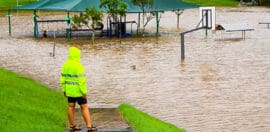Human rights groups sign on to fight climate change

15 July 2021 at 8:36 am
“As a humanitarian organisation, we recognise that we have a responsibility and a collective responsibility to support climate change mitigation and adaptation”
A refugee support charity has become one of the first Australian organisations to sign onto a global climate agreement, in a move it hopes will inspire more humanitarian groups to do the same.
Settlement Services International (SSI) recently announced it had signed onto the Climate and Environment Charter for Humanitarian Organisations, a global agreement launched by the International Committee of the Red Cross in May.
The Australian Red Cross and the Jesuit Refugee Service make up the rest of the Australian signatories.
The charter has been adopted by around 70 organisations worldwide since its launch, and sets out six commitments to steer collective humanitarian action in response to climate change.
SSI senior policy and project officer Carmen Ghaly told Pro Bono News that it was time humanitarian organisations acknowledged that refugee displacement was increasingly linked to and exacerbated by the impacts of climate change.
She said that people living in conflict affected countries were also disproportionately affected by the impacts of climate change.
“As a humanitarian organisation, we recognise that we have a responsibility and a collective responsibility to support climate change mitigation and adaptation,” Ghaly said.
SSI has signed onto four of the six commitments. These include:
- maximising the environmental sustainability of its work and rapidly reducing its greenhouse gas emissions;
- working closely with local communities in tackling climate change;
- increasing the organisation’s understanding of environmental risks and developing evidence-based solutions; and
- serving as agents of change to mobilise stronger climate action and environmental protection.
Ghaly said while other global agreements and frameworks to measure action on climate change did exist, this was the first to specifically target humanitarian organisations.
“We see the charter as a good stepping stone… it’s a really important opportunity for organisations like ours to sign on and then implement the commitments in our own time frame and then set further targets,” she said.
In terms of accountability, she said SSI was currently developing a timeline to work towards the commitments, and would work alongside other signatories to inform their process.
She said SSI was now planning to connect with organisations inside and outside of their network to encourage them to sign onto the agreement and increase awareness of how the humanitarian sector could play a part in fighting climate change.
“We’re hoping to increase the literacy on climate change within the community sector and encourage organisations to make similar commitments to what we’ve made,” she said.
“I think the charter is a good example of how we can really link some of the local work that is happening on climate change to the global work that is happening within the humanitarian sector.”







